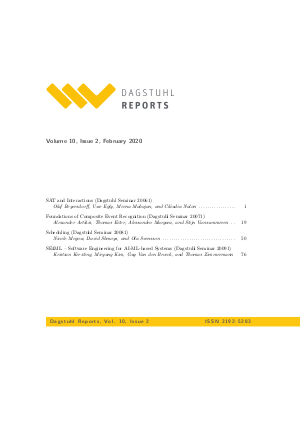Dagstuhl Reports, Volume 10, Issue 2
-
Part of:
Volume:
Dagstuhl Reports, Volume 10
Journal: Dagstuhl Reports (DagRep)

Event
- Dagstuhl Seminars 20061, 20071, 20081, 20091
Publication Details
- published at: 2020-09-17
- Publisher: Schloss Dagstuhl – Leibniz-Zentrum für Informatik
- DBLP: db/journals/dagstuhl-reports/dagstuhl-reports10
Access Numbers
- Detailed Access Statistics available here
-
Total Document Accesses (updated on a weekly basis):
0PDF Downloads
Documents
Dagstuhl Reports, Volume 10, Issue 2, February 2020, Complete Issue
Abstract
Cite as
Dagstuhl Reports, Volume 10, Issue 2, pp. 1-89, Schloss Dagstuhl – Leibniz-Zentrum für Informatik (2020)
Copy BibTex To Clipboard
@Article{DagRep.10.2,
title = {{Dagstuhl Reports, Volume 10, Issue 2, February 2020, Complete Issue}},
pages = {1--89},
journal = {Dagstuhl Reports},
ISSN = {2192-5283},
year = {2020},
volume = {10},
number = {2},
publisher = {Schloss Dagstuhl -- Leibniz-Zentrum f{\"u}r Informatik},
address = {Dagstuhl, Germany},
URL = {https://drops.dagstuhl.de/entities/document/10.4230/DagRep.10.2},
URN = {urn:nbn:de:0030-drops-130554},
doi = {10.4230/DagRep.10.2},
annote = {Keywords: Dagstuhl Reports, Volume 10, Issue 2, February 2020, Complete Issue}
}
Dagstuhl Reports, Table of Contents, Volume 10, Issue 2, 2020
Abstract
Cite as
Dagstuhl Reports, Volume 10, Issue 2, pp. i-ii, Schloss Dagstuhl – Leibniz-Zentrum für Informatik (2020)
Copy BibTex To Clipboard
@Article{DagRep.10.2.i,
title = {{Dagstuhl Reports, Table of Contents, Volume 10, Issue 2, 2020}},
pages = {i--ii},
journal = {Dagstuhl Reports},
ISSN = {2192-5283},
year = {2020},
volume = {10},
number = {2},
publisher = {Schloss Dagstuhl -- Leibniz-Zentrum f{\"u}r Informatik},
address = {Dagstuhl, Germany},
URL = {https://drops.dagstuhl.de/entities/document/10.4230/DagRep.10.2.i},
URN = {urn:nbn:de:0030-drops-130569},
doi = {10.4230/DagRep.10.2.i},
annote = {Keywords: Table of Contents, Frontmatter}
}
SAT and Interactions (Dagstuhl Seminar 20061)
Abstract
Cite as
Olaf Beyersdorff, Uwe Egly, Meena Mahajan, and Cláudia Nalon. SAT and Interactions (Dagstuhl Seminar 20061). In Dagstuhl Reports, Volume 10, Issue 2, pp. 1-18, Schloss Dagstuhl – Leibniz-Zentrum für Informatik (2020)
Copy BibTex To Clipboard
@Article{beyersdorff_et_al:DagRep.10.2.1,
author = {Beyersdorff, Olaf and Egly, Uwe and Mahajan, Meena and Nalon, Cl\'{a}udia},
title = {{SAT and Interactions (Dagstuhl Seminar 20061)}},
pages = {1--18},
journal = {Dagstuhl Reports},
ISSN = {2192-5283},
year = {2020},
volume = {10},
number = {2},
editor = {Beyersdorff, Olaf and Egly, Uwe and Mahajan, Meena and Nalon, Cl\'{a}udia},
publisher = {Schloss Dagstuhl -- Leibniz-Zentrum f{\"u}r Informatik},
address = {Dagstuhl, Germany},
URL = {https://drops.dagstuhl.de/entities/document/10.4230/DagRep.10.2.1},
URN = {urn:nbn:de:0030-drops-130576},
doi = {10.4230/DagRep.10.2.1},
annote = {Keywords: SAT, MaxSAT, QBF, proof complexity, deep inference, modal logic, solving}
}
Foundations of Composite Event Recognition (Dagstuhl Seminar 20071)
Abstract
Cite as
Alexander Artikis, Thomas Eiter, Alessandro Margara, and Stijn Vansummeren. Foundations of Composite Event Recognition (Dagstuhl Seminar 20071). In Dagstuhl Reports, Volume 10, Issue 2, pp. 19-49, Schloss Dagstuhl – Leibniz-Zentrum für Informatik (2020)
Copy BibTex To Clipboard
@Article{artikis_et_al:DagRep.10.2.19,
author = {Artikis, Alexander and Eiter, Thomas and Margara, Alessandro and Vansummeren, Stijn},
title = {{Foundations of Composite Event Recognition (Dagstuhl Seminar 20071)}},
pages = {19--49},
journal = {Dagstuhl Reports},
ISSN = {2192-5283},
year = {2020},
volume = {10},
number = {2},
editor = {Artikis, Alexander and Eiter, Thomas and Margara, Alessandro and Vansummeren, Stijn},
publisher = {Schloss Dagstuhl -- Leibniz-Zentrum f{\"u}r Informatik},
address = {Dagstuhl, Germany},
URL = {https://drops.dagstuhl.de/entities/document/10.4230/DagRep.10.2.19},
URN = {urn:nbn:de:0030-drops-130587},
doi = {10.4230/DagRep.10.2.19},
annote = {Keywords: complex event processing, event algebra, pattern matching, stream reasoning, temporal reasoning}
}
Scheduling (Dagstuhl Seminar 20081)
Abstract
Cite as
Nicole Megow, David Shmoys, and Ola Svensson. Scheduling (Dagstuhl Seminar 20081). In Dagstuhl Reports, Volume 10, Issue 2, pp. 50-75, Schloss Dagstuhl – Leibniz-Zentrum für Informatik (2020)
Copy BibTex To Clipboard
@Article{megow_et_al:DagRep.10.2.50,
author = {Megow, Nicole and Shmoys, David and Svensson, Ola},
title = {{Scheduling (Dagstuhl Seminar 20081)}},
pages = {50--75},
journal = {Dagstuhl Reports},
ISSN = {2192-5283},
year = {2020},
volume = {10},
number = {2},
editor = {Megow, Nicole and Shmoys, David and Svensson, Ola},
publisher = {Schloss Dagstuhl -- Leibniz-Zentrum f{\"u}r Informatik},
address = {Dagstuhl, Germany},
URL = {https://drops.dagstuhl.de/entities/document/10.4230/DagRep.10.2.50},
URN = {urn:nbn:de:0030-drops-130590},
doi = {10.4230/DagRep.10.2.50},
annote = {Keywords: scheduling, optimization, approximation algorithms, routing, transportation, mechanism design}
}
SE4ML - Software Engineering for AI-ML-based Systems (Dagstuhl Seminar 20091)
Abstract
Cite as
Kristian Kersting, Miryung Kim, Guy Van den Broeck, and Thomas Zimmermann. SE4ML - Software Engineering for AI-ML-based Systems (Dagstuhl Seminar 20091). In Dagstuhl Reports, Volume 10, Issue 2, pp. 76-87, Schloss Dagstuhl – Leibniz-Zentrum für Informatik (2020)
Copy BibTex To Clipboard
@Article{kersting_et_al:DagRep.10.2.76,
author = {Kersting, Kristian and Kim, Miryung and Van den Broeck, Guy and Zimmermann, Thomas},
title = {{SE4ML - Software Engineering for AI-ML-based Systems (Dagstuhl Seminar 20091)}},
pages = {76--87},
journal = {Dagstuhl Reports},
ISSN = {2192-5283},
year = {2020},
volume = {10},
number = {2},
editor = {Kersting, Kristian and Kim, Miryung and Van den Broeck, Guy and Zimmermann, Thomas},
publisher = {Schloss Dagstuhl -- Leibniz-Zentrum f{\"u}r Informatik},
address = {Dagstuhl, Germany},
URL = {https://drops.dagstuhl.de/entities/document/10.4230/DagRep.10.2.76},
URN = {urn:nbn:de:0030-drops-130603},
doi = {10.4230/DagRep.10.2.76},
annote = {Keywords: correctness / explainability / traceability / fairness for ml, data scientist productivity, debugging/ testing / verification for ml systems}
}